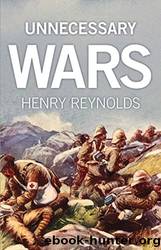Unnecessary Wars by Henry Reynolds

Author:Henry Reynolds [Reynolds, Henry]
Language: eng
Format: epub, azw3, mobi
Tags: Non-Fiction, History, War, Politics, Boer War, Australia
ISBN: 9781742242279
Publisher: NewSouth Publishing
Published: 2016-06-09T13:00:00+00:00
8
The critics of the war
It was easier to express dissident opinions about the empire and the war in the colonial parliaments â and, after 1901, in the federal House of Representatives and the Senate â than in other public places. Judging from the reports of speeches, unpopular views were listened to with reasonable decorum, apart from occasional interjections. It no doubt also helped that in most of the parliaments, small groups of like-minded critics of majority opinion helped strengthen resolve and provide protection from that greatest handicap of dissident minorities â the sense of complete isolation and the wounding imputation of pointless eccentricity.
The dissenters shared common ground right across Australia; their opinions and speeches could have been interchangeable. And this happened without any apparent sharing of views or pooling of opinions. It is unlikely that parliamentarians knew much about what was happening in the other legislatures. If they actually read speeches made in the other colonies, it could only be much later, when official parliamentary debates were exchanged and lodged in the libraries. The major metropolitan newspapers reported intercolonial political events but rarely gave accounts of parliamentary debates. Australian politicians probably heard more about dissident opinion in Britain than in the sister parliaments. There was no doubt reassurance when it became apparent that some of Britainâs most prominent and distinguished liberal politicians and intellectuals opposed the war. But the critical theme that ran through debates about the Boer War was almost entirely homegrown, relating more to local history than to the clash of opinion on the other side of the world. Considered in isolation, the small groups of dissenters could be disregarded, but looked at nationally they clearly represented a significant tradition that continues to have resonance more than a hundred years later.
Not all critics of the war could be thought of as radical nationalists, but they were certainly men whose focus was centred on Australia and who questioned the need for overseas involvement. In the debate in New South Wales on the Boxer Rebellion contingent, George Reid argued that âthe Australian military spirit is not for foreign serviceâ. It was for the defence of the country. And that alone was a serious matter: âWith our enormous territory, as large as the United States, and our sparse population settled upon that vast surface, if we equip land forces sufficient for the defence of this great continent, we do all the empire can expect us to doâ.1
In South Australia, during the Boer War debates, John Darling followed the same line of argument, feeling strongly that it was imprudent for the people of Australia to join in a quarrel outside the colonies. The local defence forces were for national defence and not for training men to be sent to fight in other parts of the world.2 The distance between Australia and South Africa featured prominently in oppositional argument. The first proposition was that Australians were being sent to fight with and kill men they knew little about who could never present a threat to the Australian homeland.
Download
Unnecessary Wars by Henry Reynolds.azw3
Unnecessary Wars by Henry Reynolds.mobi
This site does not store any files on its server. We only index and link to content provided by other sites. Please contact the content providers to delete copyright contents if any and email us, we'll remove relevant links or contents immediately.
The History of Female Warriors by Ellen C. Clayton(86)
Insurgency and Counterinsurgency in the Nineteenth Century by Mark Lawrence(74)
Iron Fist by Bryan Perrett(66)
Unnecessary Wars by Henry Reynolds(44)
The Life and Adventures of Guzman D'Alfarache, or the Spanish Rogue, vol. 13 by Mateo Alemán(34)
The Life and Adventures of Guzman D'Alfarache, or the Spanish Rogue, vol. 33 by Mateo Alemán(27)
The Life and Adventures of Guzman D'Alfarache, or the Spanish Rogue, vol. 23 by Mateo Alemán(24)
Tangled Tales from Nine Special Forces by Col Awadhesh Kumar & Col Ranjit Singh(12)
Logics of War: Explanations for Limited and Unlimited Conflicts by by Alex Weisiger(7)
